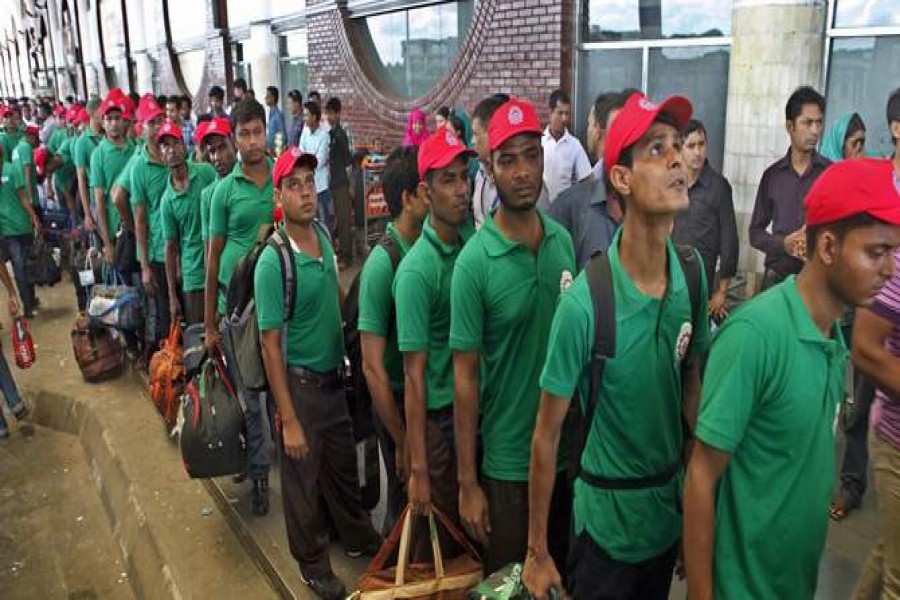The situation of the plight of the migrant workers in most parts of the world reflects a more or less uniform narrative, thanks to the increasing flow of cheap labour from poor countries to destinations abroad where more often than not, traps are well set to exploit them to the best of the devious scheming by their employers.
This is more so in case of the unskilled and uneducated lot who remain literally at the mercy of not only their overseas employers but even before their adventurous trips from home countries they are to give in to the wishes of the recruiting agents with barely any say in any bargain of sorts. The situation is so common with most of the migrant workers in different regions that their misery and exploitation in the name of overseas employment essentially characterise the conditions integral to labour migration.
The World Bank and the International Labour Organisation conducted a survey on the subject in the Asia-Pacific and the Gulf regions that pinpoints some of the very well known issues in precise terms. If these are taken into account, one may find labour migration as one of the most scandalous forms of demeaning human dignity in the 21st century.
The findings of the aforesaid survey were presented recently at the 16th ILO Asia and the Pacific Regional Meeting in Bali, Indonesia. According to the survey, more than 75 per cent of the respondent migrant workers said they received wages lower than what they were promised before they had left their home countries or experienced unforeseen deductions. Their wages were at least 30 per cent lower than what they were promised. About 14.5 per cent of them said they did not receive wages on time. About 30 per cent of the workers did not have a contract prior to departure and they also experienced health-related problems and in the absence of contract on healthcare they are to bear the highly unaffordable medical expenses on their own. Of them, about one in five had serious work-related injuries, which is above the national averages. About 25 per cent of the migrant workers did not have any weekly day-off. The average number of weekly hours is 71, with sizeable gender disparities.
The survey report notes that there are only a few governments that have well-regulated systems facilitating the legal and transparent movement of low or semi-skilled workers. As a result, in most countries low-skilled and unskilled workers aspiring to secure jobs abroad become prone to abusive recruitment practices like debt bondage, forced labour and human trafficking carried out by unregulated intermediaries that violate both local and international laws.
The Bangladeshi migrant workers, needles to say, are no exceptions. While less than promised wage is common to many, a large majority of the migrant workers are routinely subjected to exploitation of all sorts bordering on slavery. The situation in many of the major destinations of Bangladeshi workers in the Gulf and Middle Eastern regions, save exceptions, tells of the same tale of misery and suffering.
The plight of the migrant workers in the East Asian region, especially in Malaysia, has left a terrible impact on the fate of thousands who for long has been the victim of sheer deceit and subjugation. Apparently, it seems that the situation has improved, thanks to some stern actions on the part of the Malaysian government.
Lately, one of the key migrant workers' destination-- Singapore has also been found to be the source of a lot of suffering for Bangladeshi workers. More than 200,000 Bangladeshi workers are currently engaged in Singapore, mainly in the construction and cleaning sectors. Some days ago, a Singaporean migrant rights activist Alex Au of the Transient Workers Count Too (TWC2)-- an NGO which monitors the rights issue of workers in Singapore-- visited Bangladesh and informed the local media that most of the Bangladeshi migrant workers in Singapore are now going through acute hardship mainly because of poor wage. The aforesaid NGO had conducted a survey on over 1,000 Bangladeshis in Singapore last year. It found that almost all workers had to pay minimum Tk 300,000 as skill training costs and Tk 600,000 to Tk 700,000 as a work permit fee.
Under the prevailing circumstances with shrinking job opportunities in Singapore, it is impossible to recover the money, let alone make even a small saving after years of pitiless drudgery. The visiting rights activist while talking to a local daily expressed disgust at the way workers are now being recruited and employed in hazardous jobs in Singapore. While small pay and long hours are a regular phenomenon in most cases in Singapore these days, according to the rights activist, the worst that it takes on the workers is a tight bondage from which they can rarely free themselves.
Much has been said since long about the suffering of migrant workers. The government at times seemed earnest to do something. So far, there has not been any progress in sight. Disciplining the system looks like an insurmountable task.


